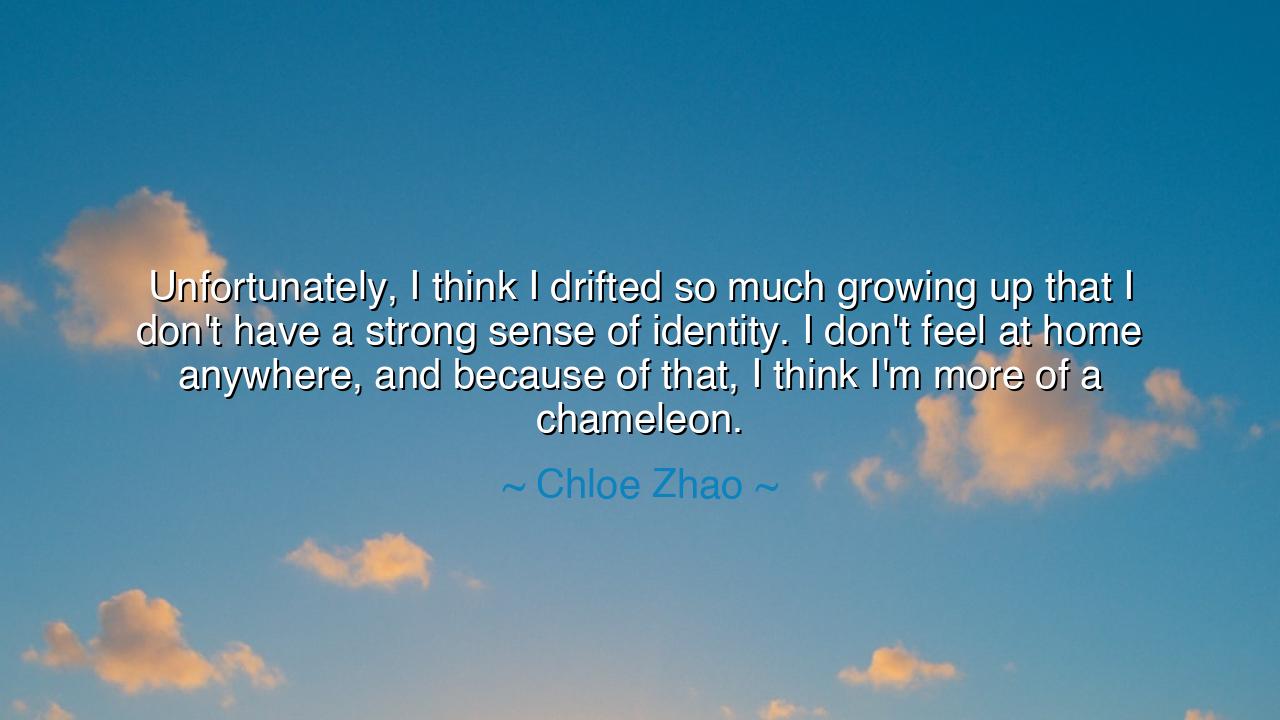
Unfortunately, I think I drifted so much growing up that I don't
Unfortunately, I think I drifted so much growing up that I don't have a strong sense of identity. I don't feel at home anywhere, and because of that, I think I'm more of a chameleon.






In the tender and haunting words of Chloé Zhao, the acclaimed filmmaker whose work captures the quiet vastness of the human soul, we hear a confession that echoes through the ages: “Unfortunately, I think I drifted so much growing up that I don’t have a strong sense of identity. I don’t feel at home anywhere, and because of that, I think I’m more of a chameleon.” Though spoken softly, her words carry the weight of a timeless longing — the yearning to belong, to find the soil where the heart may take root. Her voice is not only her own; it is the voice of every wanderer, every exile, every soul who has traveled far across lands, cultures, and expectations, seeking the place where the self might finally rest.
To drift is to move without anchor, to be carried by unseen currents. Zhao’s words reveal the condition of a life stretched between worlds — born in one, raised in another, and shaped by both yet fully claimed by neither. Many who have lived as she has — children of migration, of movement, of divided identity — come to know this strange dissonance: that one can belong everywhere and nowhere at once. Yet from this drifting also arises a rare power — the ability to see, to understand, to adapt. The chameleon, whom Zhao names herself after, is not a creature of deceit, but of survival — one who harmonizes with the world rather than dominates it. Through her changeability, she endures.
In the ancient world, the poet Homer told of Odysseus, the wanderer who journeyed across endless seas, from the ruins of Troy to the farthest isles of mystery. Though he encountered kings, monsters, and gods, his greatest struggle was not with them, but with himself — to remember who he was amidst the constant flux of circumstance. Like Zhao, he too was a drifter, shaped by the world’s vastness and yet estranged from it. Each place he visited changed him; yet each change brought him further from home. When he finally returned to Ithaca, he was not the same man who had left. The lesson of Odysseus is this: to travel the world is to gather many selves, and in doing so, to lose the simplicity of one.
Chloé Zhao’s admission of being a “chameleon” is not a weakness, but an act of truth — a recognition that identity is not always solid, but fluid, shaped by the landscapes of our experiences. In her films, such as Nomadland, we see this philosophy unfold — characters who wander the American wilderness, searching not for possessions or permanence, but for meaning. Like her, they are people between worlds, finding fragments of home in fleeting moments of connection. The wisdom in her words reminds us that to live without a fixed identity can also mean to live with empathy — to see the world not through the narrow eyes of one culture or one life, but through the expanded vision of the many.
The origin of her words lies in her own life: born in China, educated in England, refined in America, Zhao carries within her the imprints of three civilizations. Her sense of displacement is not merely geographical, but spiritual — a symptom of our modern age, in which boundaries blur and identities mix. She speaks for a generation raised amidst globalization and digital migration, where belonging has become an idea more than a place. And yet, her success as a storyteller shows that from this rootlessness can spring deep understanding — the kind that belongs to those who can see the common humanity in all things.
The ancients would have called such a life the path of the seeker. For they believed that the one who never settles becomes the one who truly sees. The mystic Heraclitus wrote, “You cannot step into the same river twice,” meaning that all is change, and the self, too, must flow. To live as Zhao describes — to drift, to adapt, to become — is not to lose identity, but to live in harmony with the truth of impermanence. The chameleon does not deny its colors; it honors them all, wearing each as the moment demands. Perhaps, then, Zhao’s words are not sorrowful, but wise — a revelation that identity is not a fixed stone, but a shifting constellation of experiences.
Let this be the lesson: home is not a place, but a peace of the heart. The one who drifts must learn not to fear the motion, but to trust its rhythm. You may not belong to a single country, a single people, or even a single dream — but you belong to the great story of humanity itself. To be a chameleon is not to lose yourself, but to expand yourself, to embrace the infinite possibilities of being.
Action to take: if you feel adrift, do not despair. Let each place, each encounter, each sorrow and joy, add to your palette of colors. Do not rush to define yourself; instead, let your experiences shape you naturally, as the river shapes the stone. Learn from Chloé Zhao, who found art in her wandering and wisdom in her rootlessness. For though she may not feel “at home anywhere,” she has learned the greatest truth of all — that those who wander without walls often carry within them a home as vast as the world itself.






AAdministratorAdministrator
Welcome, honored guests. Please leave a comment, we will respond soon